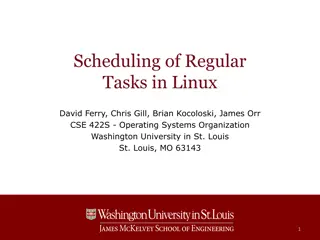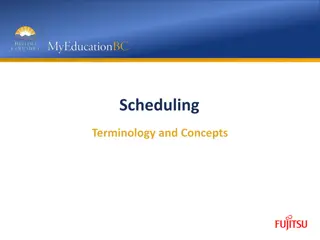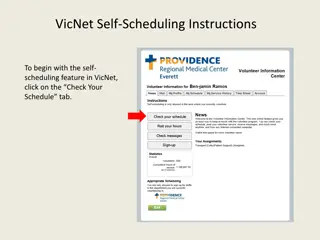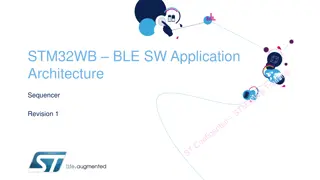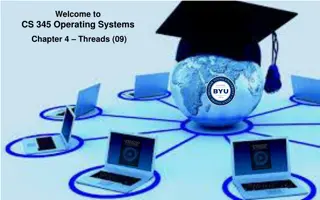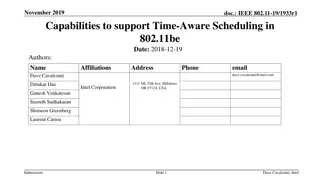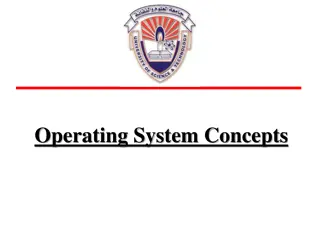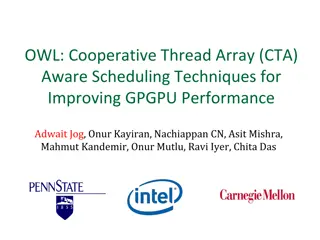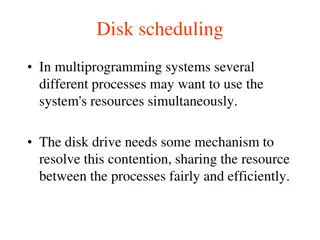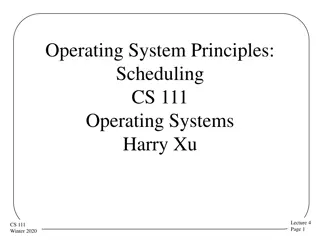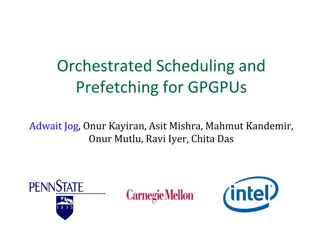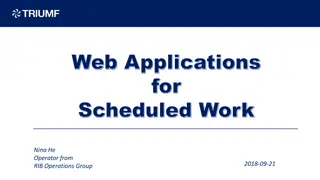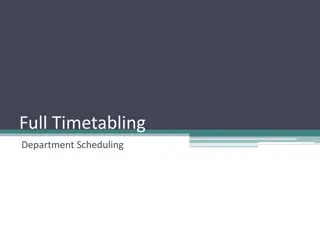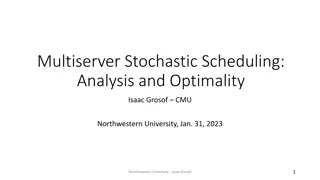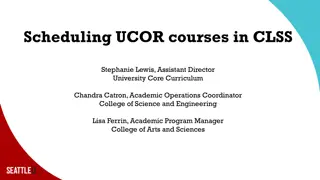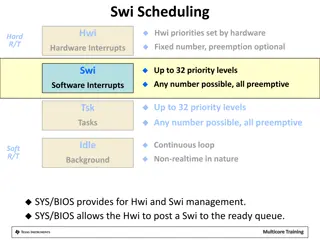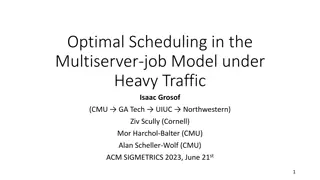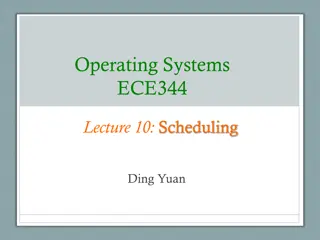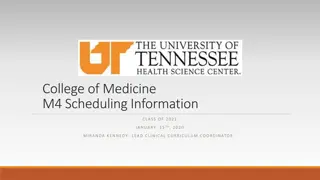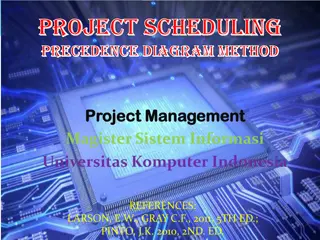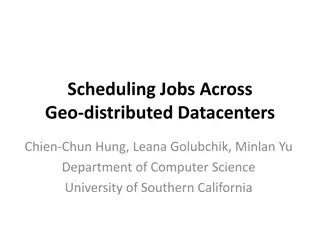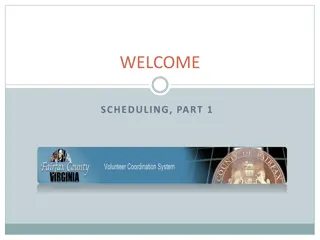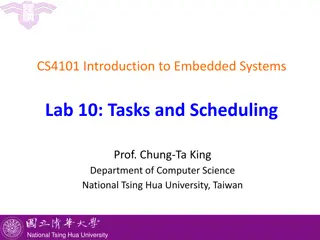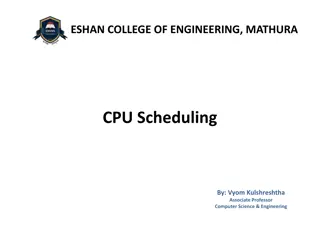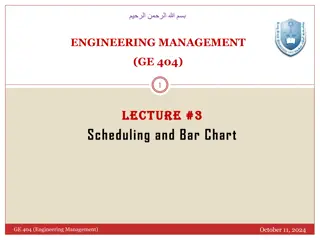Enhancing Student Success through Block Scheduling at KSU
National Institute for Student Success (NISS) diagnostic analysis at KSU shows the importance of block scheduling in increasing graduation rates and student engagement. Actions to increase registration for full-time schedules and improve student success are underway. The goals of KSU's block schedul
0 views • 10 slides
Linux Process Scheduling and Priorities
Delve into the intricacies of process scheduling in Linux systems, covering topics such as task prioritization, process states, scheduler decisions, and important scheduling scenarios. Learn about traditional scheduling concerns like throughput and latency, as well as different types of workloads su
4 views • 19 slides
Enhanced Scheduling Method for Low Latency Traffic in IEEE 802.11-24/0091r1
This document presents an enhanced scheduling method for handling low latency traffic in IEEE 802.11 networks. It focuses on supporting deterministic and event-based latency-sensitive traffic, addressing challenges in scheduling and resource allocation. The proposed method aims to improve the reliab
9 views • 12 slides
Scheduling Terminology and Concepts in MyEdBC
Explore the key terminology and concepts related to scheduling in MyEdBC, including the Build view, scenarios, flat and rotated schedules, patterns, and base terms. Get insights into setting up scheduling structures and preferences, as well as managing course requests and staff information. Enhance
3 views • 13 slides
VicNet Self-Scheduling Instructions
Begin using the self-scheduling feature in VicNet by following step-by-step instructions, such as checking available shifts, selecting a day to volunteer, viewing specific times, scheduling yourself, and managing your shifts. Contact Volunteer Services for additional help or questions.
2 views • 6 slides
STM32WB BLE SW Application Sequencer Architecture Overview
The STM32WB BLE SW Application Sequencer is a specialized framework that optimizes while loop bare-metal implementations to avoid race conditions, especially in low power modes. It is not intended to compete with standard operating systems but rather with bare-metal implementations. The sequencer al
3 views • 14 slides
Threads and Task Scheduling in Operating Systems
Threads and task scheduling play a crucial role in modern operating systems. This chapter delves into the concept of threads, including standard integer typedefs and the importance of multitasking. It explores the implementation of a five-state task scheduler capable of executing multiple tasks effi
0 views • 25 slides
GPU Scheduling Strategies: Maximizing Performance with Cache-Conscious Wavefront Scheduling
Explore GPU scheduling strategies including Loose Round Robin (LRR) for maximizing performance by efficiently managing warps, Cache-Conscious Wavefront Scheduling for improved cache utilization, and Greedy-then-oldest (GTO) scheduling to enhance cache locality. Learn how these techniques optimize GP
1 views • 21 slides
Time-Aware Scheduling Capabilities in IEEE 802.11be
Describing necessary enhancements to enable Time-Aware Scheduling in IEEE 802.11be for time-sensitive applications. The focus is on aligning with the 802.1Qbv standard to address latency, jitter, and reliability issues, presenting a structured outline of requirements and configurations essential for
1 views • 24 slides
Scheduling Algorithms in Operating Systems
Exploring the world of scheduling in operating systems, this content covers various aspects such as introduction to scheduling, process behavior, bursts of CPU usage, CPU-bound and I/O-bound processes, when to schedule processes, and the differences between non-preemptive and preemptive scheduling a
1 views • 34 slides
CPU Scheduling in Operating Systems
In a single-processor system, processes take turns running on the CPU. The goal of multiprogramming is to keep the CPU busy at all times. CPU scheduling relies on the alternating CPU and I/O burst cycles of processes. The CPU scheduler selects processes from the ready queue to execute when the CPU i
1 views • 26 slides
Greedy Method for Task Scheduling Problems
The greedy method is a powerful algorithm design technique used in solving various optimization problems. In the context of task scheduling, we explore two specific problems: minimizing the number of machines needed to complete all tasks and maximizing the number of non-overlapping intervals on a si
1 views • 58 slides
Improving GPGPU Performance with Cooperative Thread Array Scheduling Techniques
Limited DRAM bandwidth poses a critical bottleneck in GPU performance, necessitating a comprehensive scheduling policy to reduce cache miss rates, enhance DRAM bandwidth, and improve latency hiding for GPUs. The CTA-aware scheduling techniques presented address these challenges by optimizing resourc
0 views • 33 slides
Simplifying Residency Shift Scheduling with Mathematical Programming Techniques
This project, led by Professor Amy Cohn and William Pozehl, aims to demonstrate how mathematical programming techniques can simplify the complex task of residency shift scheduling. The Residency Shift Scheduling Game highlights the challenges of manual scheduling and the ease of using mathematical p
1 views • 37 slides
Disk Scheduling in Multiprogramming Systems
In a multiprogramming system, several processes may contend for disk resources. Disk scheduling aims to efficiently share the disk drive's resources among processes, maximizing I/O request satisfaction while minimizing head movement. Various disk scheduling policies like FCFS, SSTF, and SCAN aim to
1 views • 22 slides
Operating System Scheduling Principles
Operating system scheduling involves making decisions on resource allocation among multiple clients, determining who gets to use the resource next and for how long. Different scheduling algorithms aim to achieve specific goals, such as maximizing throughput, minimizing waiting time, ensuring fairnes
0 views • 57 slides
Orchestrated Scheduling and Prefetching for GPGPUs
This paper discusses the implementation of an orchestrated scheduling and prefetching mechanism for GPGPUs to enhance system performance by improving IPC and overall warp scheduling policies. It presents a prefetch-aware warp scheduler proposal aiming to make a simple prefetcher more capable, result
1 views • 46 slides
Evolution of Shift Work Scheduling at an Accelerator Facility
Operators at an accelerator facility used to rely on manual processes and multiple systems for shift work scheduling and timesheet management. With the implementation of new interactive applications, the process has been streamlined, allowing for better planning, efficient submission of timesheets,
0 views • 32 slides
Efficient Department Scheduling for Timetabling Success
Efficient timetabling for a department involves various stages like data entry, draft timetable creation, feedback collection, production of the final timetable, schedule adjustments, and publication. Key information needed includes faculty availability, room inventory, specific scheduling parameter
0 views • 59 slides
Multiserver Stochastic Scheduling Analysis
This presentation delves into the analysis and optimality of multiserver stochastic scheduling, focusing on the theory of large-scale computing systems, queueing theory, and prior work on single-server and multiserver scheduling. It explores optimizing response time and resource efficiency in modern
0 views • 38 slides
Effective UCOR Course Scheduling Strategies
This resource provides specific instructions, tips, and reminders for scheduling UCOR courses in CLSS. Learn about approved titles, using the CLSS heat map, cross-listing steps, workflow tips, deadlines, and more. Access CLSS and UCOR resources, including training materials, production calendars, an
0 views • 13 slides
Real-Time Interrupt Handling and Scheduling in SYS/BIOS
This content covers the management of hardware and software interrupts, interrupt priorities, scheduling rules, and execution flow for real-time systems using SYS/BIOS. It discusses the handling of interrupts by the Hardware Interrupt (Hwi) and Software Interrupt (Swi) components, priority levels, p
0 views • 4 slides
New Scheduling Policy: ServerFilling-SRPT in Multiserver Job Model
Discusses a new scheduling policy, ServerFilling-SRPT, designed to favor small jobs in the multiserver job model. The policy aims to minimize mean response time by prioritizing jobs with the least remaining size order and arranging them based on server needs. The approach involves finding minimal su
0 views • 16 slides
Scheduling in Operating Systems: A Comprehensive Overview
This content delves into the intricate details of scheduling in operating systems, covering the goals, various scheduling algorithms, multiprogramming concepts, decision-making processes for resource allocation, timing considerations, scheduling objectives, and performance criteria such as throughpu
0 views • 42 slides
Overview of Task Computing in Parallel and Distributed Systems
Task computing in parallel and distributed systems involves organizing applications into a collection of tasks that can be executed in a remote environment. Tasks are individual units of code that produce output files and may require input files for execution. Middleware operations coordinate task e
0 views • 17 slides
Greedy Algorithms in Interval Scheduling
Interval Scheduling is a classic algorithmic problem where the goal is to schedule a set of tasks to maximize efficiency without overlap. Greedy algorithms play a crucial role in solving this problem by making locally optimal choices at each step. The concept of greediness, building the solution ste
0 views • 24 slides
College of Medicine M4 Scheduling Information for Class of 2021
Important scheduling timeline information for 4th-year medical students at the College of Medicine. Key dates include deadlines for hardship requests, core clerkship preferences, Geriatrics/Palliative Medicine enrollment, scheduling rounds, and publication rules. Compliance with specific requirement
0 views • 8 slides
The Precedence Diagram Method in Project Scheduling
The Precedence Diagram Method is a valuable tool for scheduling activities in project management. It helps in visualizing task dependencies, critical paths, and slack time, allowing for efficient project planning and execution. Through the method, one can define task attributes, determine predecesso
0 views • 14 slides
Improving Job Scheduling with Nudge Policy
Explore the innovative Nudge policy for stochastic improvement upon First-Come-First-Served (FCFS) scheduling. The Nudge policy introduces a new approach with better performance tradeoffs compared to traditional scheduling methods. Discover how Nudge outperforms FCFS across various job size distribu
0 views • 21 slides
Job Scheduling Across Geo-distributed Datacenters
Scheduling jobs across geo-distributed datacenters poses challenges such as optimizing job completion time, reducing data transfer costs, and coordinating tasks across multiple locations. Various strategies like reordering-based approaches and scheduling heuristics are explored to enhance job schedu
0 views • 32 slides
Insights into Volunteer Scheduling and Management
Exploring the intricacies of volunteer scheduling, this informative guide covers topics such as creating schedule slots, weighing the pros and cons of scheduling, opportunity scheduling, monthly calendars, slot summaries, volunteer and opportunity listings, and more. Dive into the world of volunteer
0 views • 21 slides
Course Weighting Task Force Meeting May 11, 2017
The Course Weighting Task Force meeting held on May 11, 2017, aimed to study and potentially recommend changes to current course weighting practices within SBISD. The task force discussed members' familiarity with the system, concerns, interests, and potential impacts. The executive limitations of t
0 views • 15 slides
Embedded Systems Lab 10: Task Scheduling with Sensors, Buzzer, and LCD Display
This lab introduces task scheduling on Arduino using sensors, buzzer, and LCD display. It covers topics like generating tones with a buzzer, interfacing with an LCD display module, and examples of sample code for practical implementation. The focus is on understanding how embedded systems can manage
0 views • 17 slides
University Space Scheduling Guidelines
University space scheduling guidelines prioritize academic courses and campus use, emphasizing the need for more available space. The policy outlines expectations, scheduling guidelines, and the management of laboratory and studio spaces. It also addresses the direct scheduling of such spaces for sp
0 views • 14 slides
CPU Scheduling Concepts at Eshan College of Engineering, Mathura
Dive into the world of CPU scheduling at Eshan College of Engineering in Mathura with Associate Professor Vyom Kulshreshtha. Explore topics such as CPU utilization, I/O burst cycles, CPU burst distribution, and more. Learn about the CPU scheduler, dispatcher module, scheduling criteria, and the impl
0 views • 18 slides
Overview of Project Scheduling in Engineering Management
The lecture covers planning and scheduling in engineering management, focusing on activity and event scheduling techniques, bar charts, critical path analysis, and addressing project scheduling principles. It discusses the objectives of the lecture, the difference between planning and scheduling, th
0 views • 29 slides
Effective Task Management in Outlook Using GTD Principles
Developing efficient email and task management skills in Outlook through GTD principles. Sessions cover problem definition, zero inbox concept, MYN basics, task creation from emails, task subject context, and task start dates. Learn to create, organize, and track tasks effectively for improved produ
0 views • 20 slides
Linux Scheduling
This content delves into different aspects of Linux scheduling, from the real-world scenarios to the evolution of schedulers in Linux versions. It covers topics such as process selection, priorities, task handling, the Linux 2.4 scheduler, the Linux O(1) scheduler in version 2.6, run queues, approac
0 views • 26 slides
Overview of big.LITTLE Technology
This content provides an in-depth exploration of big.LITTLE technology, focusing on its introduction, implementation, and rationale. It discusses features like global task scheduling, supporting GTS in OS kernels, and task distribution policies in heterogeneous multicore processors. The technology's
0 views • 113 slides
EEVDF: The New Linux Scheduler Overview
This presentation delves into the EEVDF Linux scheduler, highlighting its ideal scheduling concepts, task priorities, time-based scheduling, and vRuntime explanation. It covers the efficient handling of dynamic task additions and deletions, as well as the Core Fair Scheduler (CFS) mechanisms based o
0 views • 22 slides

